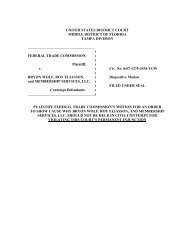HELO RCPT TO QUIT MAIL FROM DATA - Federal Trade Commission
HELO RCPT TO QUIT MAIL FROM DATA - Federal Trade Commission
HELO RCPT TO QUIT MAIL FROM DATA - Federal Trade Commission
You also want an ePaper? Increase the reach of your titles
YUMPU automatically turns print PDFs into web optimized ePapers that Google loves.
Subject Line Labeling As a Weapon Against Spam<br />
1. Objectives of State Subject Line Labeling Requirements<br />
Although legislative history discussing the rationale and basis underlying<br />
state labeling laws is scant, the legislative history in two states, Arizona and<br />
California, sheds some light on the objectives of state labeling requirements.<br />
Legislators in Arizona believed that an ADV labeling requirement would facilitate<br />
spam investigations because it would simplify the task of assessing whether<br />
a violation had occurred. 15 Some sources consulted in preparing this Report<br />
expressed the theme that subject line labeling could provide an additional “hook”<br />
for law enforcement in the form of an additional violation to charge. 16<br />
The California legislative history suggests that the State Assembly was<br />
fully aware of the likely limitations of subject line labeling. The report of the<br />
Committee on Consumer Protection, Governmental Efficiency, and Economic<br />
Development of the California Assembly noted that critics of the bill questioned<br />
whether the labeling provisions could be effectively enforced against spam that<br />
originates from outside California. 17 We believe that a national subject line<br />
labeling requirement raises the same concern because spam often originates<br />
overseas.<br />
2. Enforcement of State Subject Line Labeling Requirements<br />
Very few states were able to bring enforcement actions charging violations of<br />
their subject line labeling requirements under their state spam laws. <strong>Commission</strong><br />
staff contacted the attorney general offices of all 20 states that had enacted subject<br />
line labeling laws; several of these offices noted that their statutes were preempted<br />
by the CAN-SPAM Act before they were able to file enforcement actions. 18<br />
Staff found that only one state with a labeling requirement, California,<br />
successfully brought an action under its general spam statute. The complaint<br />
alleged violations of virtually all provisions of the California statute, including<br />
15. Fiscal Analysis of Arizona House Bill 2107, 46th Legis. Sess. 1 (Ariz. 2003), available at http://<br />
www.azleg.state.az.us.<br />
16. Internet Engineering Task Force (“IETF”): Hardie, 12; EPIC: Hoofnagle, 20; CFA: Fox, 8.<br />
17. Appropriations Committee Fiscal Summary of Assembly Bill 1676, 1997-1998 Legis. (Cal. 1998),<br />
available at http://www.leginfo.ca.gov. Although the legislative history is limited with respect to the labeling<br />
provision of the anti-spam statute, the history shows that the California Internet Industry Alliance opposed<br />
California’s ADV labeling requirement because labeling would be potentially damaging to Internet users,<br />
could be misunderstood by foreign Internet users, and would conflict with labeling requirements of other<br />
states. Senate Comm. on Bus. and Professions Bill No. AB 1676, 1997-1998 Legis. (Cal. 1998).<br />
18. These states include Illinois, Kansas, Oklahoma, Tennessee, Texas, and Utah.<br />
5

















